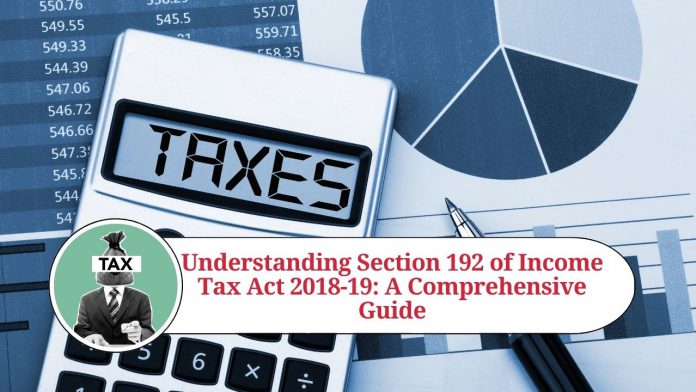Section 192 of the Income Tax Act, 1961 lays down the provisions for TDS (Tax Deducted at Source) on salaries. It is an important provision that both employers and employees must comply with, to ensure proper payment of income tax.
In this blog, we will explore the key provisions of Section 192 of Income Tax Act 2018-19, including the TDS rate, applicability, and other important aspects that employers and employees should be aware of.
What is TDS on Salaries?
TDS on salaries refers to the tax that is deducted from an employee’s salary by the employer and deposited with the government on their behalf. The TDS is calculated based on the employee’s income tax slab rate.
For instance, if an employee’s income for the financial year exceeds the minimum taxable limit, their employer is required to deduct TDS from their salary each month and deposit it with the government.
Key Provisions of Section 192
- Applicability of Section 192
Section 192 applies to all types of salaries paid to employees by employers. This includes basic salary, dearness allowance, bonus, commission, and any other monetary payments that are classified as part of the employee’s salary.
- TDS Rate
The TDS rate for salaries is determined based on the employee’s income tax slab rate. The current TDS rates for the financial year 2018-19 are as follows:
- For employees with an annual income of up to Rs. 2.5 lakhs, no TDS is applicable.
- For employees with an annual income between Rs. 2.5 lakhs and Rs. 5 lakhs, the TDS rate is 5%.
- For employees with an annual income between Rs. 5 lakhs and Rs. 10 lakhs, the TDS rate is 20%.
- For employees with an annual income above Rs. 10 lakhs, the TDS rate is 30%.
- Threshold Limit for TDS
Employers are not required to deduct TDS on salaries if the employee’s total income for the financial year is below the minimum taxable limit. For the financial year 2018-19, the minimum taxable limit is Rs. 2.5 lakhs.
- Calculation of TDS
The TDS on salaries is calculated based on the employee’s income tax slab rate and the tax-exempt investments declared by the employee. If an employee has invested in tax-saving instruments such as Public Provident Fund (PPF), National Savings Certificate (NSC), or Equity-Linked Saving Scheme (ELSS), they can submit proof of these investments to their employer to lower the TDS rate.
- Filing of TDS Returns
Employers are required to file quarterly TDS returns with the government. These returns must include details of the TDS deducted from employee salaries and deposited with the government. Employers must also issue Form 16 to their employees, which contains details of the TDS deducted from their salaries.
Conclusion
Section 192 of the Income Tax Act 2018-19 is an important provision that both employers and employees should be aware of. Employers must ensure that they comply with the TDS provisions and deposit the deducted TDS with the government on time. Employees, on the other hand, must ensure that they declare all their tax-saving investments to their employer to lower their TDS liability. By complying with the provisions of Section 192, both employers and employees can avoid penalties and ensure proper payment of income tax.
Read more useful content:
- section 234e of income tax act
- section 286 of income tax act
- section 90a of income tax act
- section 40a(7) of income tax act
- section 226(3) of income tax act
- section 24 of income tax act
Frequently Asked Questions (FAQs)
Q1. What is Section 192 of the Income Tax Act 2018-19?
A1. Section 192 of the Income Tax Act, 1961 lays down the provisions for TDS (Tax Deducted at Source) on salaries.
Q2. Who is liable to deduct TDS under Section 192?
A2. The employer is liable to deduct TDS under Section 192.
Q3. What is the TDS rate for salaries under Section 192?
A3. The TDS rate for salaries is determined based on the employee’s income tax slab rate. The current TDS rates for the financial year 2018-19 are 5%, 20%, and 30%, depending on the employee’s annual income.
Q4. What is the threshold limit for TDS under Section 192?
A4. Employers are not required to deduct TDS on salaries if the employee’s total income for the financial year is below the minimum taxable limit. For the financial year 2018-19, the minimum taxable limit is Rs. 2.5 lakhs.
Q5. Can an employee reduce their TDS liability under Section 192?
A5. Yes, an employee can reduce their TDS liability by declaring their tax-saving investments such as PPF, NSC, and ELSS to their employer.
Q6. What is Form 16 under Section 192?
A6. Form 16 is a certificate issued by the employer to their employee containing details of the TDS deducted from their salaries.
Q7. What is the penalty for non-compliance with Section 192?
A7. Failure to comply with the provisions of Section 192 can result in penalties and interest charges levied by the Income Tax Department.
Q8. Is there any exemption for senior citizens under Section 192?
A8. No, there is no specific exemption for senior citizens under Section 192. They are subject to the same TDS rates as other employees.
Q9. Is TDS on salaries applicable to freelancers and self-employed professionals?
A9. No, TDS on salaries is not applicable to freelancers and self-employed professionals as they do not receive a salary from an employer.
Q10. Can an employee claim a refund of excess TDS deducted under Section 192?
A10. Yes, an employee can claim a refund of excess TDS deducted by filing an income tax return and mentioning the excess TDS amount in the return. The excess amount will be refunded by the Income Tax Department.




















